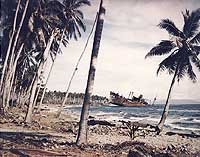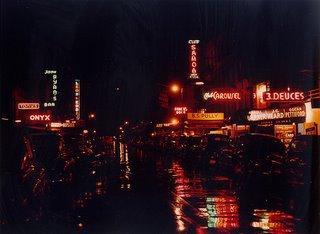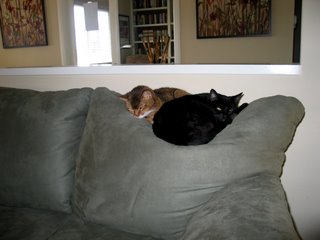
Life in the post-cold war, Internet-based world is just endlessly interesting.
Not that life wasn’t interesting before, it’s just that we’re able to do things now that were simply unimaginable when I was a kid, or even before I turned 40.
I suppose every generation can say that, of course. My Dad was 13 when Lindbergh flew the Atlantic; less than 40 years later he himself was flying to the Far East on a passenger plane. No doubt having the one experience while remembering the other would have given him pause no less than does the fact that I’m able to swap e-mails all afternoon with my pal Vasiliy, who lives in Moscow.
Vasiliy is a nightowl and I’m an early bird. This makes us perfect e-mail pals: when it’s 3 O’clock in the afternoon in California, it’s 2 O’clock the next morning in Moscow. I’m digesting my lunch and he’s pecking away at his computer while Moscow sleeps.
It hasn’t even been a generation since this was unthinkable. It’s only been about 15 years. Not only were the United States and the Soviet Union enemies in everything but name, but in 1991 there was effectively no such thing as e-mail, because in 1991 there was effectively no such thing as the Internet. I went to Africa that year, and a friend of mine suggested that there might be some way we could connect our computers to modems and swap information between California and Africa over the phone. It was an intriguing idea, but it seemed a bit farfetched.
Now Vasiliy and I sit here, 6,147 miles apart, and chit-chat all afternoon (or all night, depending on whether you’re looking over my shoulder or his) like a couple of little old ladies on a park bench feeding the pigeons. And not surprisingly, the topic of conversation is quite often how the world has changed in our lifetimes. Vasiliy is older than I, so his memories go back farther. I vaguely remember Kruschchev and Kennedy; Vasiliy remembers Stalin and Truman.
He sent me an electronic newspaper clipping last week, from the English-language Moscow Times newspaper. The article, by journalist Gyorgi Bovt, was called Playing on the Old Myths, and it addressed, in a Russian context, a depressing, perhaps even scary phenomenon that I have noticed in an American context: young people today don’t know anything.
I’m serious. Young people today can tell you all about the last episode of American Idol. They can show you how to set up your iPod. They’re computer savvy. They’re whizzes at text-messaging on cell phones.
But most of them couldn’t find Washington, D.C. on a map if their lives depended on it; they write “it’s” for “This animal is nocturnal in its eating habits,” and they think LOL is a word. They can’t concentrate for more than four minutes, they consider Grand Theft Auto a productive way to spend an afternoon, and they think John F. Kennedy was some guy who was president back around the time of Lincoln.
Guess what? Russia has the same problem. Playing On the Old Myths began with the writer expressing dismay at some of the questions his daughter asks him. She and her peers know next-to-nothing about Russia’s communist past. The generation born after Mikhail Gorbachev’s Perestroika—which is already 20 years behind us—has no memory of what its parents remember: standing in line for three hours to buy some sausage. Lenin’s picture everywhere you looked. A telephone call if you failed to show up for a Komsomol meeting, demanding the reason for your absence. Having to go into the kitchen and turn on the radio if you wanted to talk safely. The GULAG.
Today’s Russian kids are as uninterested in anything that happened earlier than last week as their American counterparts. And that’s a little scary: some of them even think things Soviet are kind of cool, like today’s blissfully ignorant American 20 year-olds going around wearing Che Guevara T-shirts because the idea of revolution is also, like, you know, kind of cool. They don’t want to hear about Stalin; they barely know who he was. It goes without saying that they don’t read Solzhenitsyn, although I'm told he is required reading in Russian schools now. But, kids being kids, I'm sure that only accomplishes the opposite of what's intended: if you want a young person to avoid a certain author, just make that author "required reading." I was required to read Nathaniel Hawthorne myself, and today wouldn't touch him with a ten-foot scarlet "A." (And isn't that a funny bit of irony: a generation ago Russians were forbidden to read Solzhenitsyn. Now their children are encouraged to read him, but they don't want to.)
For 40 years and more, Russians obsessed about World War II. It was all they wanted to talk about. As late as 1985, an American diplomat noted the curiosity of attending a Soviet embassy dinner and finding that World War II dominated the conversation all evening long. Russia’s experience in World War II was like nothing in modern history: the country was invaded and 26 million people died, many of them civilians. (By contrast, the U.S. took roughly 250,000 casualties in that war, almost all of them military.)
But the difference between our generation and the current one is, we were interested in remembering, even what we didn’t personally remember. I was born 10 years after the war ended, but my school pals and I were steeped in it as history. Was this because we were smarter than today’s kids? No, it was a mass-culture phenomenon. The generation that fought World War II, and the Korean War which followed it a few years later, came home and became a gigantic television and movie audience, and we, its children, formed a vicarious audience for what our parents were watching. Hollywood saw gold: all these people who had experienced the war, or even just military service if they hadn’t actually seen action, were of course going to be fascinated by their own experience. I grew up awash in TV shows and movies about World War II: dramas as true-to-life as Combat! And comedies as silly as McHale’s Navy were our weekly fare in those days. And then there were the semi-documentaries, earnest programs such as Battle Line and Navy Log, which kept our fathers boring us over dinner, correcting the shows’ mistakes.
That all of this would rub off on us kids of the 1960s was inevitable. By the time I was eight I could recite the names of the Normandy beaches on D-Day: Utah, Omaha, Sword, Juno and Gold. (Utah and Omaha were the Americans; Sword and Gold the British, and Juno the Canadians.) We boys often ran around after school re-enacting World War II battles with toy guns. (Today’s parents would be horrified by the idea of giving their children toy guns to play with, but they have no problem with their children playing video games that center around blowing up buildings.) About the same time I was reading a written-for-children account of D-Day, I went to a friend’s birthday party and we boys were taken out for a big treat: we were taken to a war museum at which we were shown a display, under glass, animated by the standards of that day but static by today's standards, that used model ships and electric lights to re-create the attack on Pearl Harbor in 1941. There was a voice narration, and lights were used to track the events of the attack: ships that had been sunk were illuminated in red; those that escaped were lit green. I cannot imagine an audience of eight year-olds standing still for such a thing today, but we were truly fascinated.
We even discussed the war among ourselves, if you can imagine such a thing. And it was the kind of discourse that only eight year-olds could have. My best pals in the fourth grade were Brown Russell and Marty Jorgensen. Brown’s father was a major in the army, (unusual for San Diego, which is a huge navy town) and Marty’s was a chief in the navy. Not only was re-enacting World War II moments a regular part of our play, but we would teach each other history, the funky history of eight-year-olds to be sure, but it showed where our interests lay.
Marty regaled me one afternoon with his account of “The Battle of Groncho.” Now, I knew all about D-Day, and I knew about Pearl Harbor, and I had heard of Midway, and I knew about Wake Island and ultimately, about Hiroshima, but this Battle of Groncho was a new one on me. I probed Marty with questions. Was this battle against the Germans or the Japanese? The Japanese, was the answer. So it was fought in the Pacific. Which side won? “U.S.,” he answered.
And so on and so on, until I figured out that he was talking about the Battle of Guadalcanal, which he couldn’t pronounce.
I don’t mean to be rough on today’s younger generation (aside from the fact that they’re semi-literate and as ignorant as monads.) In fairness to them, there is nothing in their parents’ past like what we had in ours. There was no global convulsion in the 1970’s and ‘80s comparable to what happened in the ‘30s and ‘40s, reshaping the entire world that came after. But it wasn’t a dull time either (well, once we got out of the ‘70s, which were all in all pretty dreary). There was in fact big global stuff happening in the ‘80s, it’s just that it didn’t involve tanks and guns to anywhere near the extent it did 40 years earlier. And by the way, the things that Ronald Reagan, Margaret Thatcher and Mikhail Gorbachev did in the 1980s, did in fact reshape our world almost as dramatically as the guns and bombs of the 1940s. Don’t think so? Listen to this tidbit of dinner conversation I recall: in 1991 my wife and I were invited to Christmas dinner by some friends at the American embassy in Abidjan, Cote d’Ivoire, where I was then posted. It was on that very day that Gorbachev went on Soviet television, announced that he was resigning as Premier of the USSR, wished everyone good night and good luck, and walked quietly off the stage, ringing down the curtain after 74 years on a nation.
Someone at the dinner table remarked, “Have you noticed how much the map of Europe today looks like the map of Europe in 1912?”
Think that wasn’t a reshaping of the world, refashioning Europe, in grand ricorso fashion, so that it looked once again much the way it looked before Gavrilo Princip shot Archduke Francis Ferdinand, triggering World War I, which would in turn trigger World War II, which would in turn...
No, Gavrilo Princip is not a rapper. And World War I happened after the American Civil War, not before it. And Albania is a country, not the capital of New York. And...oh, hell. Is it time for Survivor yet?





